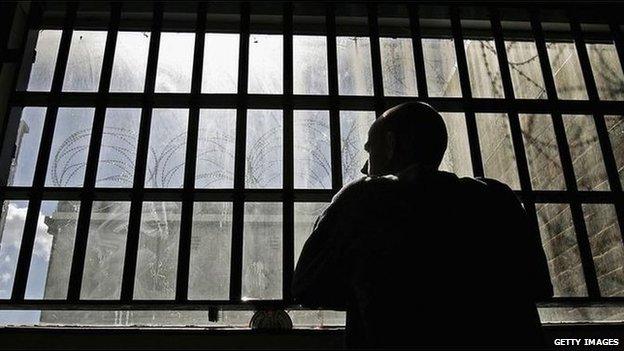Prisoner voting ruled out for another year
- Published
- comments

The European court first ruled in favour of giving some British prisoners the vote in 2005
Eight years, 11 months and 21 days. That's how much time has passed since the European Court of Human Rights first told the UK that it had to change the law on prisoners voting. But so far no final bill has seen the light of day in Parliament.
Now, the saga will go on for yet another year - after a political compromise that, rather usefully to both sides, avoids the row blowing up as the British general election approaches.
To recap: the ECtHR ruled back in 2005 that the UK's blanket ban on prisoners voting must be amended to allow at least some inmates to vote. The case, brought by the convicted killer John Hirst, argued that the ban worked against helping resettle offenders.
The then Labour government repeatedly ducked and dived to avoid dealing with the issue and ultimately dropped a political time bomb in the lap of the incoming Tory-Lib Dem coalition.
But now the coalition has ducked it too - throwing it in the direction of whoever wins next year's election.
Earlier this week, the Council of Europe committee that oversees the court's decisions met to discuss what they were going to do with the UK's failure to implement the judgement.
The council is made up of all the member states, including the UK, that are party to the European Convention on Human Rights - and it had the rare treat of a mitigation plea of sorts from a justice minister - Lord Faulks. Rather usefully, he is a QC so he knows a thing or two about how to beg for mercy for his client.
The peer gave a string of assurances that the UK fully backs the European Convention on Human Rights - and convinced the members to give the UK more time to sort out prisoners votes once and for all.
Most importantly, he told them that the UK would fulfil its obligations.
The committee then published which raps London's knuckles for not changing the law while, simultaneously, declaring that Europe will take no action until at least September 2015.
So the upshot is that, yet again, nothing is going to happen. Here's why.
While the European Court of Human Rights is a legal body - the Council of Europe is political and has to try to keep everyone onside.
London was one of the most important architects of the post-war human rights system and Strasbourg simply doesn't want to provoke a crisis with a nation so central to improving the rule of law around the world.
The worst-case scenario is the UK, if provoked, would refuse to abide by the judgement - something that no country has ever done. That could then be used by less enlightened member states to ignore far more serious breaches of human rights. The UK could threaten to walk away - as some on the right want it to do - and the system would come crashing down.
But, equally, given that the UK officially supports the human rights convention, another year of delay suits the government as it heads towards a general election in which the rise of UKIP means Europe is going to be a major issue.
In other words, why have a row now...when it could be best put off for another year.
- Published12 August 2014